Stop before you shop! You can give meaningful holiday gifts without buying new

Our economy runs on consumption, especially during the holiday season — and we as consumers are ceaselessly tempted by a barrage of emails, ads and newsfeeds alerting us to the newest holiday deals.
And while the environmental impact of buying a brand-new gift for a loved one may not seem obvious, multiplied by the hundreds of millions of people doing the same, the resources spent really start to add up.
Journalist Annalise Griffin, who decided to stop buying new for the holidays altogether, spoke about her commitment to secondhand gifts in a conversation with NPR's Mary Louise Kelly.
Here's her advice on shopping differently this holiday season by reworking our perception of gift-giving and rethinking what makes a present meaningful.
Sponsored
Adopt a more open-minded approach to gift-giving
In the annual rush of holiday shopping, it's easy to forget why we're choosing to give in the first place. A thoughtful gift does not have to be expensive or bought off of a wish list, says Griffin. Get creative! One year, she packed a Christmas gift box with an array of homemade treats like cookies, pancake mix and granola. Last year, Griffin got her whole family in on the act of paring down by having her kids tie-dye white clothes from a local thrift store.
This mindful approach to preparing gifts has also changed the way Griffin shops. Rather than trying to cram all of her purchases in just before the holidays, she instead notes items throughout the year that her family and friends would appreciate — whether at the local thrift store or while scrolling through an online marketplace.
"I'm always looking for something that speaks to me, like [saying] someone's name. There are a few other things stashed away in my closet that spoke to me throughout the year and that to me, feels really generous and lovely."
Sponsored
Talk to your loved ones about your commitment
Whether you are making a tangible commitment to cutting out frivolous spending or simply beginning to rethink your relationship to consumerism, this holiday can be a good starting point to share your ideals with your partner or children. You may even be able to persuade them to keep one another accountable, like Griffin did with her husband.
"We've been married for 11 years, and the sort of feeling that you're just going through places and picking something off of a list that that person provides for you and then putting it under the tree [as] it's going to be a surprise — it felt really not great to us," she says.
For Griffin's family, communicating these feelings led to their concrete decision to exchange secondhand gifts during the holidays. Likewise, your actions can impact the way your children perceive using and gifting used items. It may be hard to convince your 10-year-old that they can't have the latest iPhone for Christmas, so having these conversations early on can go a long way.
Sponsored
Explore online thrifting
Shopping for gifts is a lot of work, and many of us default to online shopping to avoid crowds and save time.
If you don't have a favorite local thrift store or just love ordering things online, there are several wonderful websites for buying used items, says Griffin. Her go-to's for shopping for clothes and housing items include the more familiar eBay and Poshmark. For vintage goods, she recommends shopgoodwill.com. "They often have really good vintage toys, so if you have a relative or a friend who now has kids, and you played with some sort of classic toy in the '80s or '90s together, you can find it on there, which to me is a very thoughtful gift."
There are also online communities for giving away or trading items with people in your neighborhood. Through her local Buy Nothing group, which is dedicated to giving and receiving goods for no cost, Griffin has been sharing close-to-new baby clothes that have been lying around in her home, while saving "$50 on junky plastic toys."
Having to actually deal "with this mountain of stuff that goes along with being a parent of small children in the U.S. has really made me aware of stuff," says Griffin. "And being able to recycle it back into my community and then to get things for free from my community has been very liberating."
Sponsored
A version of this episode originally aired on NPR's All Things Considered, produced by Elena Burnett and edited by Courtney Dorning.
Janet W. Lee produced the episode and wrote the digital story for Life Kit.
We'd love to hear from you! Leave us a voicemail at 202-216-9823, or email us at LifeKit@npr.org. If you love Life Kit and want more, subscribe to our newsletter.



